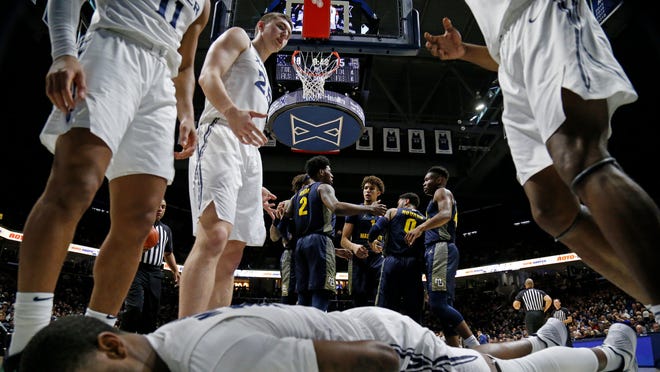

There are a lot of ways to look at the Cincinnati Reds’ 2020 season with its many ups and downs. They returned to the postseason for the first time in seven years, but they were eliminated without scoring a run.
Trevor Bauer became the first pitcher in franchise history to win the Cy Young Award. The rest of the pitching staff was quite good, too. But then there was the offense, which scored the third-fewest runs per game and finished with an abysmal .212 batting average. They scored 243 runs and allowed 243 runs.
The Reds finished the regular season with a 31-29 record in the abbreviated 60-game schedule. They were six games under .500 on Sept. 12, then won 11 of their final 14 games against mostly playoff teams.
So, how will that team be remembered? Here are five games that defined the Reds’ 2020 season:
5. Luis Castillo pitches his first career complete game in win over Cardinals (Sept. 11)

It was one of those performances that seemingly came out of nowhere. The Reds hadn’t won a series in a month and their playoff hopes were fading. They had just played a sloppy 4-hour, 7-minute game in Chicago that didn’t end until 12:40 a.m. local time because it followed a 75-minute rain delay. Then they still had to travel to St. Louis, arriving in their hotel after 4 a.m.
Despite the circumstances, Luis Castillo pitched his first career complete game in a 3-1 win in St. Louis. He allowed two hits and one run in 112 pitches, striking out six. It was the first nine-inning complete game by a Reds pitcher since Scott Feldman on May 7, 2017.
It was the first time Castillo pitched more than six innings in a start during the 2020 season, pumping 98-mph fastballs in the ninth inning.
“I don’t know what was more fun to watch: the way he pitched in the complete game or just seeing the smile at the end of the game,” manager David Bell said afterward. “It doesn’t get any better than that.”
When catcher Curt Casali was asked about a turning point in the season a couple of weeks later, he pointed to Castillo’s complete game.
“That was pretty incredible,” Casali said. “He did something he’s never done in his career and everybody just took a second to appreciate that. On a team that was left for dead, pretty much, he’s still going out there and doing that for us, throwing a complete game. I think everybody just kind of jumped on board after that, like this is cool. We have the players to do it.”
4. Tyler Stephenson walk-off homer begins Reds’ hot streak (Sept. 14)

During the final two weeks of the season, every game was considered a must-win to stay in the playoff race. A four-game series against the lowly Pittsburgh Pirates at Great American Ball Park provided a big opportunity to make up some ground.
The series started with a doubleheader and Trevor Bauer carried a one-hitter through the first six innings in Game 1. Bauer was three outs from a shutout when he surrendered a game-tying, solo homer to Colin Moran to open the seventh inning. Talk about a massive gut punch.
Bauer gave up hits to two of the next three hitters, including an infield single back to the mound, before he was pulled. Closer Raisel Iglesias kept the game tied, striking out the next two batters, but it was one of those games that had the here-we-go-again feeling.
That changed in the bottom of the seventh inning when pinch-hitter Tyler Stephenson delivered a two-run, walk-off homer with two outs.
It turned out to be one of those season-saving plays. What were Stephenson’s thoughts as he ran around the bases?
"Did that just happen?" he said.
3. Bullpen collapses in loss to Detroit (July 25)

The Reds were supposed to have the league’s easiest schedule to begin the season with 14 of their first 25 games vs. Detroit, Kansas City and Pittsburgh, including six of their first 10 against the Tigers. Everyone emphasized the importance of playing well in the first two weeks and the Reds should’ve had a big advantage with their schedule.
But the first signs of trouble were in their season-opening series against Detroit. In the second game of the season, the Reds held a two-run lead in the seventh inning. Robert Stephenson gave up a solo homer, then Michael Lorenzen surrendered a go-ahead, two-run blast to Miguel Cabrera.
With the game tied in the ninth inning, after the Reds tied the score with a Casali home run, Iglesias yielded a go-ahead homer to JaCoby Jones.
Several members of the bullpen were roughed up at the start of the season, leading the Reds to cycle through a lot of relievers before the group excelled in September. After 19 games, the Reds were already 6.5 games out of first place in the division.
2. Trevor Bauer dominates on short rest to propel the Reds to the postseason (Sept. 23)

The Reds put themselves in a position to make the postseason by winning eight of their last 10 games entering their series finale against the Milwaukee Brewers. Everything was riding on the final game because it was the difference between the Reds holding a tiebreaker over Milwaukee (season series record) or losing the tiebreaker.
Bauer, pitching on short rest, became the frontrunner in the Cy Young race by pitching a gem in the Reds’ 6-1 victory. Bauer permitted one run on four hits across eight innings, striking out 12. He retired 11 hitters in a row at one point, setting the tone in the do-or-die game.
The most memorable moments, however, were in the sixth inning after the first two batters reached base against him. The Reds had a five-run lead thanks to three homers, but Bauer slammed the door shut when he struck out the next three batters, yelling louder after each successive punchout.
His eight innings were a season-high. His final pitch of the regular season was a curveball that dropped five feet in front of the plate, but it had enough bite to elicit a swing from Christian Yelich. Once Yelich was tagged out, Bauer strutted off the field.
“He’s not afraid of any situation,” Bell said of Bauer. “He trusts himself. He trusts the work that he puts in to prepare himself."
The Reds clinched a spot in the postseason with their next win.
1. Reds squander opportunities in 1-0 loss to Braves in Game 1 of the Wild Card Series (Sept. 30)

Playing in the postseason for the first time since 2013, the Reds received a historic start from Bauer (12 strikeouts and zero walks in 7 2/3 innings while permitting only two hits) and their bullpen, but the offense couldn’t provide any support.
The Reds hit 1-for-12 with runners in scoring position – Joey Votto advanced from second to third on a Eugenio Suárez single in the top of the 13th inning – and left 13 runners on base. They loaded the bases in the 11th inning and stranded a runner on third in the 12th and 13th innings.
There was the disastrous attempted double-steal attempt to end the seventh inning, which came one inning after Nick Castellanos was thrown out trying to advance to third on a single to left field.
The game started with back-to-back hits by Nick Senzel and Castellanos, but the next three hitters – Votto, Suárez and Mike Moustakas – failed to hit the ball out of the infield, a precursor of what was to come.
The Braves, meanwhile, didn’t have a hit from a leadoff double in the sixth inning until a single in the 12th inning.
"I'm disappointed," Bauer said after his last start in a Reds uniform. "It (bleepin') sucks."
The Reds were swept out of the postseason when they lost 5-0 in Game 2, setting an MLB postseason record for the longest scoreless streak (22 innings) to start the playoffs.
Source link


